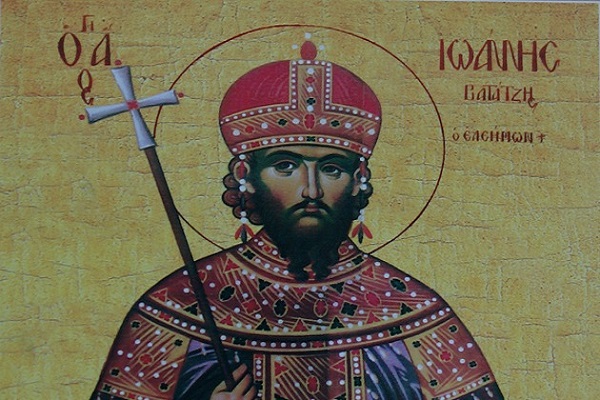Saint Ioannis Vatatzis, a compassionate and far-sighted emperor
6 November 2016On 4 November, our Church honours the memory of an outstanding personality of the Middle Ages in Greece, the emperor Ioannis Vatatzis. Ioannis came from a well-known Byzantine family which had given many exceptional members to the political and military life of the Empire.
He himself was born in Adrianoupolis. His parents died when he was still young, leaving him the master of great possessions. He chose, however, to them away to the poor and to churches, and to go to Nicaea, in Bithynia, which was, at that time, the seat of the Empire, Constantinople having been taken by the Franks during the Fourth Crusade (1204). Here he met his clergyman uncle, who was a close adviser to Emperor Theodoros (Laskaris). Through his uncle, he became well-known in court circles and, because of his meek, humble and affable nature, became a great favourite.

His reputation spread even further when he defeated the arrogant Latin, Conrad, in combat, having called upon the help of the Lord. He continued to keep a low profile and became so well-liked by the emperor that the latter married him to his daughter, Irini.
In 1222, Theodoros died and Ioannis was crowned as the new emperor. As soon as he had taken control of the state, he allowed free rein to his charitable feelings. The palace became a centre for the welfare of the poor and also of upright government. He also involved himself in the missionary activity of the Church, with the result that many Jews in his area were baptized into the Christian faith.
Saint Ioannis was particularly involved in plans to recapture Constantinople. He realized early on the importance of the Papal throne for the geopolitical balance of power in the East and addressed himself to the Vatican in order to find a path to understanding. In his policies he had the support and assistance of Patriarch Germanos II.
When, in 1232, five Latin monks returned from captivity to the Turks and passed through the Empire of Nicaea, the emperor and patriarch provided them with warm hospitality and opened the way from a more systematic dialogue with the Western Church. Besides, Irini had died in the meantime and Ioannis married Constance, the daughter of the German emperor Friedrich II. His wife was baptized Orthodox, taking the name Anna. In this way, he contracted an alliance with his new father-in-law, who had become involved in a wrangle over Papal authority. The Nicaean state therefore became of special interest to the Westerners, who vied for its favour.
In the dialogues which Ioannis held, the Roman Catholics showed no inclination to revise the innovations they had introduced. Indeed, after Friedrich’s death, they hardened their stance. Ioannis tried a number of gambits to achieve his aims, even making further concessions. The disdainful obduracy of the Westerners meant that the talks bore no fruit.
Ioannis was particularly successful in meeting the attacks from the Turkish Sultan of Iconium. It is said that during this difficult struggle, he heard a voice encouraging him, saying: ‘He Who was crucified has risen; he who was vainglorious has fallen; he who was knocked down and defeated is back on his feet’.
After his demise, he was buried in the monastery of Christ the Saviour, which he himself had founded. Later it was discovered that he had wished his remains to be taken to Magnesia. During their translation, it was apparent that the relics were still whole and filled the place with a strong fragrance. In this way, God showed His pleasure at the way of life of the man.






